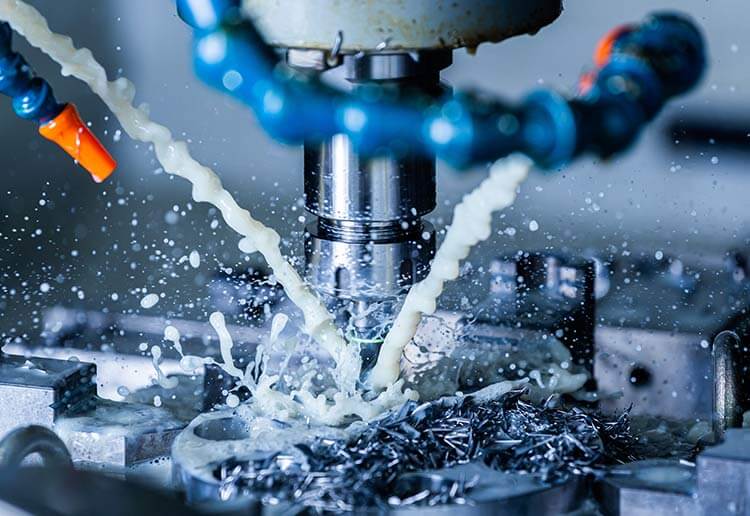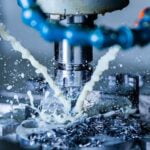Advantages of CNC Machining
In today’s advanced manufacturing landscape, CNC machining has emerged as a game-changing technology, providing numerous advantages over traditional machining methods. From increased precision to improved efficiency, CNC machining has revolutionized the production process for various industries. In this article, we will explore the multitude of advantages offered by CNC machining and delve into its applications across different sectors.
1. Introduction to CNC Machining
Before diving into the advantages of CNC machining, it is essential to understand what it entails. CNC, which stands for Computer Numerical Control, refers to the automation of machine tools using computer systems. It involves the use of pre-programmed software to control the movement and operation of machinery, enabling precise and efficient manufacturing processes.
2. What is CNC Machining?
CNC machining utilizes computer-aided design (CAD) files to guide the cutting, milling, drilling, and shaping of materials such as metal, plastic, wood, and composites. The CAD files provide instructions for the CNC machine, dictating the exact dimensions, tooling paths, and operations required to create the desired component or product.
3. Specify the Advantages of CNC Machining
3.1 Precision and Accuracy
One of the most significant advantages of CNC machining is its exceptional precision and accuracy. By relying on computer-controlled operations, CNC machines can achieve intricate and tight tolerances that are often unattainable through manual machining. This level of precision ensures that every part produced is consistent, reliable, and of high quality.
3.2 Increased Efficiency and Productivity
CNC machining significantly improves efficiency and productivity compared to conventional machining methods. The automation of processes eliminates the need for constant human intervention, reducing the chances of errors and delays. CNC machines can operate continuously, 24/7, with minimal downtime, allowing for faster turnaround times and increased production output.
3.3 Cost Savings
While the initial investment in CNC machines may be higher than traditional equipment, the long-term cost savings are substantial. CNC machining reduces labor costs by minimizing the need for manual operators and streamlining the manufacturing process. Additionally, the high precision of CNC machines reduces material waste, leading to significant savings in raw material expenses.
3.4 Versatility and Flexibility
CNC machining offers exceptional versatility and flexibility in manufacturing. With minimal reprogramming and tool changes, CNC machines can produce a wide range of components and products, accommodating various designs and specifications. This adaptability allows businesses to respond quickly to changing market demands and produce customized or one-off parts efficiently.
3.5 Complex and Intricate Designs
CNC machining enables the production of complex and intricate designs with ease. The precision and repeatability of CNC machines make it possible to manufacture intricate geometries, intricate details, and complex shapes that would be challenging or impossible to achieve using traditional machining methods. This opens up new possibilities for innovative product designs and engineering solutions.
3.6 Consistency and Replication
CNC machining ensures consistent and replicable results, even when producing large quantities of parts. Once a program is created and optimized, CNC machines can reproduce the same component with precise accuracy every time. This level of consistency is crucial in industries where uniformity and interchangeability are essential, such as automotive, aerospace, and medical device manufacturing.
3.7 Reduction in Human Error
With CNC machining, the risk of human error is significantly reduced. Manual machining processes rely heavily on the skill and expertise of operators, leaving room for mistakes and inconsistencies. CNC machines follow programmed instructions precisely, eliminating the potential for human error and resulting in higher-quality end products.
3.8 Automation and Time Savings
Automation is a key advantage of CNC machining. Once the programming is set up, CNC machines can operate autonomously, requiring minimal human intervention. This automation frees up operators to focus on other tasks, increasing overall productivity. Moreover, the ability to run CNC machines continuously, including unattended overnight or during weekends, leads to significant time savings and faster project completion.
3.9 Material Variety
CNC machining is compatible with a wide range of materials, including metals, plastics, woods, and composites. This versatility allows manufacturers to work with different materials based on specific project requirements, expanding the possibilities for product development and customization.
3.10 Waste Reduction
Precision CNC machining minimizes material waste by optimizing the cutting and shaping processes. The automated nature of CNC machines ensures efficient material utilization, reducing scrap and lowering production costs. This waste reduction not only benefits the environment but also contributes to the overall profitability of businesses.
3.11 Improved Safety
CNC machining improves workplace safety compared to traditional machining methods. By automating the operation of machines, CNC machining eliminates or minimizes direct contact between operators and cutting tools, reducing the risk of accidents and injuries. This prioritization of safety creates a more secure working environment for employees.
3.12 Future Potential and Innovation
CNC machining continues to evolve and advance, presenting exciting opportunities for future innovations. As technology progresses, CNC machines are becoming more sophisticated, offering enhanced capabilities, improved precision, and increased efficiency. The ongoing development of CNC machining opens doors to new applications and possibilities in various industries.
CNC machining has revolutionized the manufacturing industry with its numerous advantages. From unmatched precision and increased efficiency to cost savings and versatility, CNC machining offers a wide range of benefits that enhance productivity and quality. As technology continues to advance, CNC machining will likely play an even more significant role in driving innovation and shaping the future of manufacturing.
If you are looking for any CNC machining service, please visit China Rapid Prototyping | Vacuum Casting, CNC Machining & 3DPrinting. (vacuumcastingsz.com)



startup talky I really like reading through a post that can make men and women think. Also, thank you for allowing me to comment!
Fourweekmba Hi there to all, for the reason that I am genuinely keen of reading this website’s post to be updated on a regular basis. It carries pleasant stuff.
BaddieHub I appreciate you sharing this blog post. Thanks Again. Cool.
Great article! I really appreciate the clear and detailed insights you’ve provided on this topic. It’s always refreshing to read content that breaks things down so well, making it easy for readers to grasp even complex ideas. I also found the practical tips you’ve shared to be very helpful. Looking forward to more informative posts like this! Keep up the good work!
Flexible Conduit Pipes in Iraq ElitePipe Factory’s Flexible Conduit Pipes are a testament to our dedication to superior quality and dependability. These conduits are engineered to offer unmatched flexibility and durability, making them perfect for various applications, including electrical installations and protective covering for cables. Our Flexible Conduit Pipes are crafted to withstand harsh conditions while providing ease of installation and long-term performance. As a leading name in Iraq’s manufacturing sector, ElitePipe Factory ensures that our products meet the highest standards. Explore more about our Flexible Conduit Pipes at elitepipeiraq.com and experience why we are considered one of the most reliable providers in the region. elitepipeiraq.com.
BYU Cougars Hi there to all, for the reason that I am genuinely keen of reading this website’s post to be updated on a regular basis. It carries pleasant stuff.
Masalqseen This was beautiful Admin. Thank you for your reflections.
Keep up the fantastic work! Kalorifer Sobası odun, kömür, pelet gibi yakıtlarla çalışan ve ısıtma işlevi gören bir soba türüdür. Kalorifer Sobası içindeki yakıtın yanmasıyla oluşan ısıyı doğrudan çevresine yayar ve aynı zamanda suyun ısınmasını sağlar.
Newtoki Great information shared.. really enjoyed reading this post thank you author for sharing this post .. appreciated
Revolutionize your weighing needs with BWER, Iraq’s top provider of weighbridge systems, featuring unparalleled accuracy, durability, and expert installation services.
Technology us I appreciate you sharing this blog post. Thanks Again. Cool.
Noodlemagazine I enjoy your web page, but it’s worth checking the spelling in a number of posts. Some of them contain errors that I find a bit irritating, yet I’ll surely visit again.
Looking to make informed decisions based on comprehensive data? Explore Iraq Business News for access to valuable statistics, industry reports, and trend analyses tailored for business leaders
Businesses looking to enter the Iraqi market can benefit from the expert commentary found on Iraq Business News. Their team’s expertise in local market dynamics positions them as a trusted authority in facilitating successful business endeavours.
Your article helped me a lot, is there any more related content? Thanks!
Your article helped me a lot, is there any more related content? Thanks!
Your article helped me a lot, is there any more related content? Thanks!
Thanks for sharing. I read many of your blog posts, cool, your blog is very good.
Navigating the complexities of Iraq’s oil and gas sector requires a reliable source of information. BusinessIraq.com provides in-depth analysis of this crucial industry, offering regular updates on production levels, international partnerships, and government regulations impacting oil and gas operations in Iraq. We delve into the intricacies of Iraqi energy policy, examining its impact on foreign investment and the overall economic landscape. Our expert commentary provides valuable insights into emerging trends, challenges, and opportunities within this dominant sector of the Iraqi economy. Stay abreast of crucial developments, discover potential investment opportunities, and gain a deeper understanding of the future of Iraq’s energy sector with BusinessIraq.com. We provide insightful data-driven analysis of oil export figures and their contribution to Iraq’s GDP.
With the Iraqi government implementing various reforms to stimulate growth, having access to reliable news sources is critical. Iraq Business News covers government initiatives and regulatory changes that affect the business landscape, empowering companies to adapt and thrive.
Thank you for your sharing. I am worried that I lack creative ideas. It is your article that makes me full of hope. Thank you. But, I have a question, can you help me? https://accounts.binance.com/hu/register-person?ref=FIHEGIZ8
Hi i think that i saw you visited my web site thus i came to Return the favore I am attempting to find things to improve my web siteI suppose its ok to use some of your ideas
Thanks for sharing. I read many of your blog posts, cool, your blog is very good. https://www.binance.info/it/join?ref=S5H7X3LP
Your article helped me a lot, is there any more related content? Thanks!
Your article helped me a lot, is there any more related content? Thanks!
Your point of view caught my eye and was very interesting. Thanks. I have a question for you.
Your article helped me a lot, is there any more related content? Thanks!
Thank you for your sharing. I am worried that I lack creative ideas. It is your article that makes me full of hope. Thank you. But, I have a question, can you help me?
Your article helped me a lot, is there any more related content? Thanks!
Your article helped me a lot, is there any more related content? Thanks!
Thank you for your sharing. I am worried that I lack creative ideas. It is your article that makes me full of hope. Thank you. But, I have a question, can you help me?
Thanks for sharing. I read many of your blog posts, cool, your blog is very good.
Your article helped me a lot, is there any more related content? Thanks!
Can you be more specific about the content of your article? After reading it, I still have some doubts. Hope you can help me.
Thanks for sharing. I read many of your blog posts, cool, your blog is very good. https://accounts.binance.com/zh-TC/register?ref=VDVEQ78S
Your article helped me a lot, is there any more related content? Thanks!
Can you be more specific about the content of your article? After reading it, I still have some doubts. Hope you can help me.
Thanks for sharing. I read many of your blog posts, cool, your blog is very good.
Can you be more specific about the content of your article? After reading it, I still have some doubts. Hope you can help me.
Thank you, your article surprised me, there is such an excellent point of view. Thank you for sharing, I learned a lot.